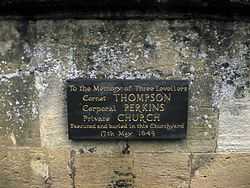Banbury mutiny

The Banbury mutiny was a mutiny by soldiers in the English New Model Army. The mutineers did not achieve all of their aims and some of the leaders were executed shortly afterwards on 17 May 1649.
The mutiny was over pay and political demands. The pay issue was defused by Oliver Cromwell acknowledging the justice of the soldiers' financial grievances and securing £10,000 towards payment of arrears from Parliament. But 400 troopers under the command of Captain William Thompson who were sympathetic to the Levellers set off from Banbury, where they were billeted, to speak with other regiments at Salisbury about their political demands.
Major White was sent by Cromwell and Thomas Fairfax to mediate with Thompson's troops and give assurances that force would not be used against them. However on 13 May Cromwell launched a night attack. Several mutineers were killed in the skirmish. Captain Thompson escaped only to be killed a few days later in another skirmish near the Diggers community at Wellingborough. After being imprisoned in Burford Church with the other mutineers,[1] three other leaders were shot: Cornet James Thompson (William Thompson's brother), Corporal Perkins and John Church on 17 May 1649.[2] This destroyed the Levellers' power base in the New Model Army.
Levellers' Day
Each year since 1975, Levellers' Day has been held in the Oxfordshire town of Burford to commemorate the three Levellers executed there.[3] A different theme is chosen for each Levellers' Day, which is held on the Saturday nearest to the 17th May, and speakers are invited to speak on the theme during the morning, this is followed by a procession around the town and a ceremony in the churchyard. In the afternoon there is music and other entertainment usually held in the garden of Warwick Hall which is next to the church. In 1979 a plaque to the three soldiers on the church wall was unveiled by Tony Benn to commemorate the event.
Levellers' Day is organised by a small group of unpaid volunteers who are dedicated to commemorating the lives of the men who were executed for their beliefs and to preserving a key moment in English political history. Currently the group is being co-ordinated by Desmond Brambley, Anne Lyons, Heather Shute, Katie Kew and Joe Chapman.[4]
See also
- The English Civil War
- The Putney Debates
- The Corkbush Field mutiny November 1647
- The Bishopsgate mutiny April 1649
References
- ↑ Stephen C. Manganiello (2004). The Concise Encyclopedia of the Revolutions and Wars of England,. Scotland, and Ireland, 1639–1660. Scarecrow Press, ISBN 0-8108-5100-8. p. 83
- ↑ Keith Lindley (1998). The English Civil War and Revolution: A Sourcebook, Routledge, ISBN 0-415-17419-8. pp. 173,174
- ↑ Tony Benn. Set my people free, The Observer, 13 May 2001
- ↑ Anne Lyons. Levellers Day in Burford BBC, 15 May 2004
Further reading
- 5 August 1649: The testimony of the Burford Levellers, Tony Gosling, 10 Highwood Close ORPINGTON, Kent BR6 8HT Cites: Brailsford, H. N. (1976). The Levellers and the English Revolution. Nottingham: Spokesman. ISBN 0-85124-154-9..